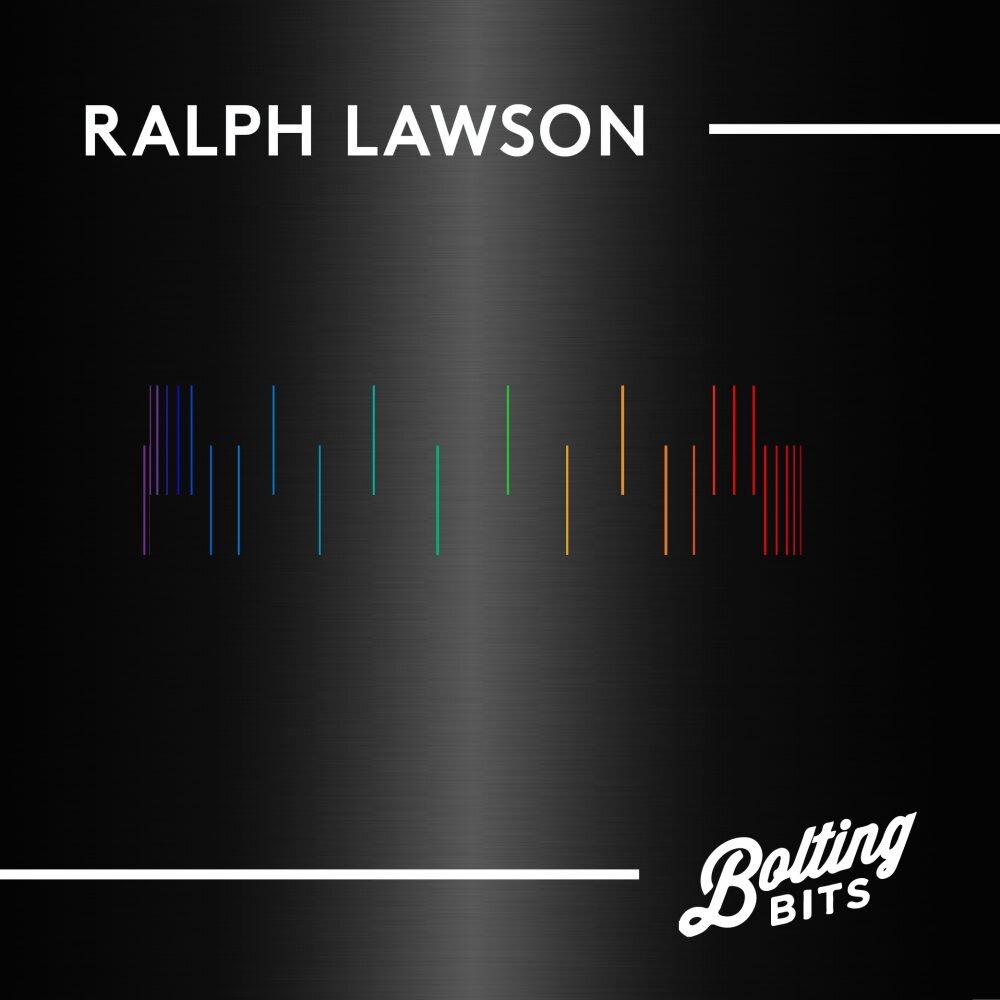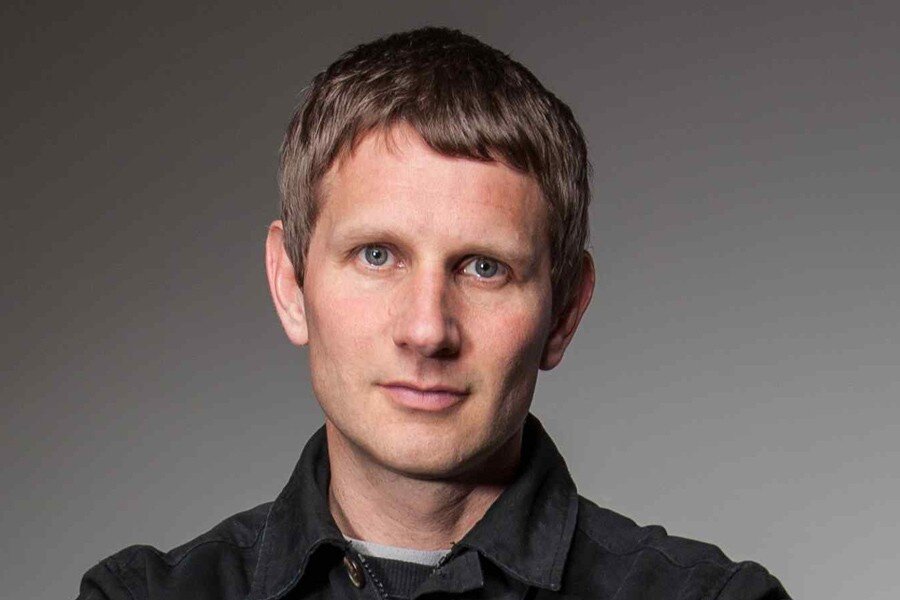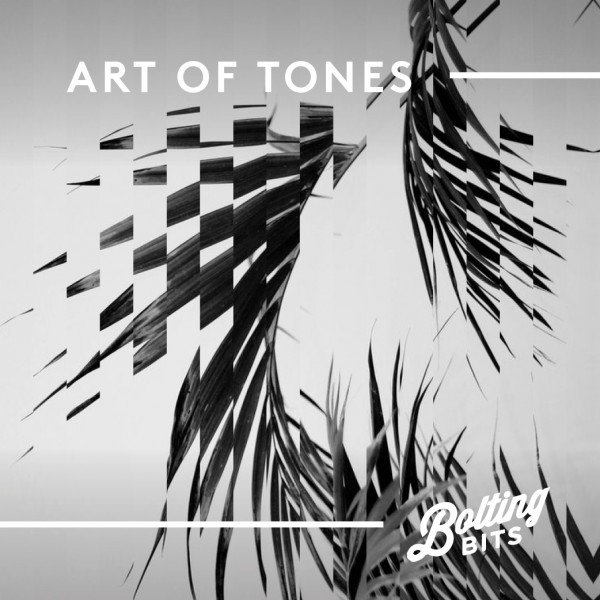
It is hard to sum up just how much of an impact Ralph Lawson has had over his 35 years career in the scene.From managing his 2020Vision label to holding down a wide range of residencies, his dedication to the craft is truly inspirational and this interview is a beautiful glimpse into his vision.
The mix he delivered us is a very special journey. It is selected and paced as expertly as you’d expect from someone who’s been playing records since more than three decades. We had the immense pleasure of chatting with Ralph and the result is an insightful and honest conversation.
INTERVIEW

Thank you for your contribution to our mix series. How and where was the mix recorded, and can you tell us the concept behind it?
For me this is a special mix – it’s the official and exclusive full length DJ mix of Exit Planet Earth – Launch. EPE started as a series of vinyl records that came out between 2020-22 but in my mind the original concept was always to create an album from the project and it would be continuous and take the listener away from the chaos people were experiencing in cities across the world over those years. I fund it such a positive release through those times to look upwards at night, well the rare nights we don’t have cloud cover in the north and reset perspectives. Going into the studio became a refuge and relief from the daily pressures and feelings of anxiety as the fabric of life as we knew it unstitched. I felt liberated and a real sense of freedom being totally alone in a basement studio blowing my mind with the incredible electronic music that emanated from every corner of the planet. I decided to collate what I was hearing onto a compilation and approached artists across five continents to contribute just one track to the project. The only brief I gave being to imagine a piece a music that they would play if they were leaving our planet behind for the last time.
It seemed to resonate, and I guess people had time on their hands, so I managed to attract many great people to create a piece of music. I don’t think it was a co-incidence that they all fit together so well as part of a DJ Mix that could indeed be the soundtrack to humans leaving the planet behind.
Every single track on the mix was exclusively commissioned for Exit Planet Earth and it was a joy to DJ Mix it all in one take live in my studio in Leeds, UK just on decks with no laptop or DAW.
As we have just entered a new year, how would you describe 2022 with one word?
Transition
You have been running your 20/20 Vision label for about 27 years, has its philosophy evolved since the first release in 1995?
Really appreciate you asking me this question as I was just thinking about this exact thing recently. And you know what freaked me out? I realised the philosophy hadn’t changed at all since our inception back in 1995 and I can only see that as a really positive thing.
For those that don’t know 20/20 Vision is when you have perfect sight. It’s an eye test. When we first got into clubs and raves the DJs would spin an eclectic blend of music, you would hear hip hop next to house next to electro next to techno. And that’s what we loved about it all. Then the scene fragmented into genres with ever decreasing fragmentation until they became micro genres with very little longevity or substance. When we lose substance, we lose meaning and people start to feel lost. I guess I was feeling lost with it all and wanted to create an ‘no genre’ label where people approached music with ‘perfect sight’ and open vision.
Nearly 30 years later and I feel deeply feel this perspective but even more so. These times are about fusion, collaboration and community and those can be as broad ranging as we not only make them – but allow them to be. It’s a real pleasure to hear many young DJs who are really mixing it up between styles and also seeing how enthusiastically audiences accept and positively react to them.
If there is evolution at 20/20 Vision it would be to enable a bigger team that can extend and expand that original philosophy. I’d love to be in a place where we could take on far more artists following far more pathways.
Are there any exciting releases planned for 2023 you feel like sharing with us?
Yes, we’re feeling very positive about 2023. When the pandemic hit and live work went over night I sat down and thought to myself, “What could we achieve if I really concentrated on the label and recorded music?”. It was such a motivating train of thought. I realised that the label hasn’t yet reached its potential and after 30 years’ work it really deserved to have my full attention.
And what is weird is that that time enabled us to get together an action plan based on the original philosophy. It became clear and focused that we needed to make imprints for each of the directions we were feeling and then let it expand from there.
So we have:
- Exit Planet Earth for electro and leftfield electronica
- Fragments of Reality for tripped out techno and house
- Crazy P Curates for disco and balearic beats
- 20/20 Vision featuring artist led album projects with no specified genre.
All those imprints have healthy release schedules with multiple records planned in 2023.
We can also announce here for the first time that we have brand new albums from ASHRR, Versalife and Voigtmann.
You were a drummer before starting behind the decks and mentioned it instrumental in your approach to Djing. How did this transition come about?
It came about from the scenes changing. One minute we all wanted to be in bands and the next moment along came acid house and everyone sold their drum kits to buy decks – me included!
I started going to the Hacienda basically in Manchester and the energy and buzz going off was just so exciting that we all wanted to jump on the decks ourselves. I was lucky that I had a background in drums as it really helped picking up beat matching and having a feel of which rhythms and records would work well together.
How many years have you been Djing before diving into production and was it an organic progression for you?
It was about two years. It came about from meeting a bunch of guys who had access to a studio in Leeds called Dock Street. I first started working with an engineer producer called Fraser Brydson and then met Carl Finlow who was the keyboard player in a local band called The Bridewell Taxis. We ended up becoming housemates and set up a studio in our living room. That studio was known as The Farmhouse and became the backbone of 20/20 Vision. All the first releases were recorded by that core crew in different guises and with different artists at The Farmhouse.
Do you feel you’re more of a DJ or a producer (or have both aspects always been as important and complementary in your career)?
I’m without doubt a DJ and have always considered myself a DJ. I’ve had imposter syndrome in a studio since day one and it’s never left because ultimately its true – I have very little talent as a producer. Sure I’ve been involved in some great productions and I’m half decent at drums and arranging but when you’ve witnessed artist like Carl Finlow first hand in a studio you know they’re on a completely different level.
It was a real joy and a privilege to have worked on so many productions with Carl and also Chez Damier from Detroit, those were my favourite times and collaborations, but I realised that all these talented artists on the label need someone focused to put out their records as well as DJ them in the clubs and I always felt far more comfortable doing both those jobs.
Never say never though, maybe I’ll be back for a last hurrah!
Throughout your 35 years in the industry, I can imagine you may have gone through some doubts about your level of involvement in the scene (or was it always clear that you would fully dedicate every day of your life to music whether through deejaying, producing, running a label, or throwing parties)?
Yes, you’re absolutely right, I have self-doubts on a daily basis! But nothing has ever been as hard as the past three years. Only from 2020 have I really questioned if it was even going to continue. The uncertainty has been excruciating as I’m sure it has been for many people. Would we have a scene to go back to and would anyone even care if we did? I don’t think we’re far enough away to reflect on quite how tough it’s been yet.
And I do struggle with feelings of age and the fact that the music industry no longer deems you ‘relevant’ past 30, let alone the rest! But you know what – I do have fundamentally strong self-belief and belief in our mission at the label and we ain’t done yet amigos!
You are also running the excellent Escape Pods podcast series on OpenLab Radio with Ben Randm. How did you guys come together for this project and how do you choose which artists you want to converse with?
Ben Randm is a stand-up comedian, DJ and presenter based in my hometown of Leeds. We’d met when he was presenting a film about back to basics, which was the club I was resident DJ for many years. He’s a real live wire with huge amounts of energy and we clicked straight away.
The moment that I realised that we needed Ben on board was when I met him by chance late on a Saturday night after the bars had shut and he was coming out of Five Guys with a takeaway. I asked him how the food was and he answered,
“Well it’s alright mate but £15! Bloomin’ Five Guys is so expensive! I wish it was just Two Guys and half the price!”
Still makes me laugh.
Escape Pods was an idea that came out of Exit Planet Earth originally. I’d wanted to extend the brief for the musicians to make a track for the series to asking guests to extend that range and chose 5 tracks for a journey into space; from Blast off, passing the planets to last contact, alien worlds and adding a track on the voyager Gold Disc.
It was also something to do over lockdown to keep busy initially and that also meant we were able to get hold of guests far easier than normal. At first we just had a hit list of random people that had been a big inspiration but it seemed to take on a life of its own and somehow it turned into a brief history of electronic music which was weird as that was never our intention. It became a Space Oddity or Odyssey perhaps.
Still really proud of that series and we spoke to some real heroes of mine including: Scientist, Suzanne Cianni, Orbital, Helena Hauff, Daniele Baldelli and many others..
Could you talk about your relationship with the city of Leeds and the evolution of the scene compared to other cities in the UK? Why do you think the city was so important to the development of electronic music?
I’m not originally from Leeds so have always felt like an outsider in the city. Leeds is in the county (State) of Yorkshire which has a long history, identity and strong accent that I will never have so even after living over three decades I still get asked where I’m from.
I guess that mentality has pushed me to be very proactive and try my best for the city. To fit in maybe. I have seen so much change over those years and do feel proud of what we’ve achieved collectively in creating a unique and vibrant city to live, work and play. When I was coming to Leeds in 1988 it felt like arriving in a one-horse town after coming from London. There really wasn’t much going on but there was a small bunch of big characters who wanted to make things happen and we did. I loved those early days as it felt special, and we were part of something in the early acid house scene. That also extended into fashion, art and places for people to hang out like bars and clubs.
back to basics played a big part on putting Leeds on the international map. At one point the club was listed as the number reason students put Leeds University down for their choice of city. It also helped kick start the area around the club, which had previously been a rough red-light district, into the coolest place to go out at night with bars popping up all along the street. There were queues so deep to get in that people blocked the road for traffic.
From the club came the desire to put the music we loved out and I learnt the record label ropes running the back to basics label, we signed artists that came to play at the club and put out records from: Josh Wink, Chez Damier & Ron Trent, Eddie Flashing Fowlkes, Herbert, X-Press 2 among others.
After working on that label I was driven to create my own imprint that focused on the music we were making at The Farmhouse and featured local artists from the city scene and that turned into 20/20 Vision. Over time we started receiving demos from international artists as well but to this day we try to support emerging talent from the city.
In 2018 I had the opportunity to curate the music for a multi venue city centre festival called inner city electronic and we ran three editions right up to the week before the pandemic in 2020. It was all about doing something on a bigger scale for the city and putting us back on the map. That endeavour was a huge challenge and involved getting venue owners who usually compete against each other to come together and co-operate. Venue owners tend to be those big characters I mentioned earlier and it often felt like trying to get rival mafia families to come to a sit down. But we managed to pull it off and had over 250 acts play, from local crews to internationally renowned artists including; Floating Points, Orbital, Peggy Gou, Octave One, KiNK, Nina Kraviz, Mr Scruff, Nightmares on Wax, Ben UFO, Midland, Iration Steppas and so many more.
Leeds suffered through the pandemic and still hasn’t recovered. There are still boarded up shops and empty units in the city centre and we lost several independent venues but like the football team the city has a ‘never say die’ attitude and there are people making things happen again behind the scenes. Like the early days, it can take just a handful of dedicated people to make things happen in a city, you’d be surprised.
We’re also really curious to hear about some producers you think are going to influence the UK scene in the years to come.
It can be as much about cities and labels as individual producers as we just spoke about and the same UK cities seem to always have huge influence on music scenes and they are London, Manchester, Glasgow and Bristol. I don’t think we even know the next producers who will emerge from those cities.
Batu with the Timedance label from Bristol always seems to be doing interesting music to me, Hessle Audio run by Ben UFO, Pearson Sound and Pangaea always have their finger on the pulse and put out ANZ, who is making waves, early on in her career. TSHA has gone real big real quick and UKG continues to be massive and a music unique to the UK. I always enjoy Shanti Celeste’s selection. Paul Woolford, who cuts his teeth at 20/20 Vision, will continue making next level music as Special Request and we will continue to see high octane beats as the youth demand faster tempos and broken beats pioneered by artists such as Sherelle. Ninja Tunes have been hugely pro-active in recent years and will continue to find the biggest new acts and of course WARP will always release the most out there experimental music. Craig Richards continues to be a taste maker who makes things happen from his base at fabric and superb festival – Houghton. Check out Calibre on his The Nothing Special label.
You have been a resident DJ in Leeds for the UK’s longest running weekly underground club night (30 years). I can imagine how much this residency must have shaped you into the artist you’ve become. You’ve been talking about the danger of extinction of resident DJs nowadays. Why do you think residencies are so important for artists as well as for the clubs and the scene in general?
Yes, I got to the 30th anniversary of back to basics as a resident DJ in 2021 and I am most definitely a resident DJ through and through. The residents crown however belongs to Domenic & Harri at The Sub Club in Glasgow who are still going strong (as far as I know). I wrote a long blog piece about resident DJs that can go into more depth if you’re interested – Resident DJ
As a producer and label owner, fair distribution of income must probably have been one of your main concerns over the years. Even though the music industry seems to have pretty much embraced the world of digital music in the last decade (and it seems we now have access to every tool to make a change), things are still very slow in this regard. Covid lockdowns have shown us once again the extent at which artists depend on their gigs to pay rent in relation to the amount of music they are putting out there.
Indie labels mostly operate on the classic 50/50 or 50% deal for artist royalties and this has been in place since we started the label nearly 30 years ago. The 50/50 deal came from the pioneering UK label Mute run by Daniel Millar and was adopted by likeminded labels such as Factory as early adopters before being used by most independent labels. It’s always proven to be a fair and equitable basis for artist / label to structure a recording royalty deal to me.
Much of the conversation around artist (producer) royalties is focused around the royalty rates received from the major platforms and labels. There has been well organised community based pressure (see #BrokenRecord) which helped galvanise the DCMS music streaming enquiry and UK Copyrights bill in 2021. Although the bill did not pass it helped focus the conversation and exert pressure on the majors to modernise and improve artist royalties.
The loss of live income during the pandemic was indeed a massive eye opener for the music industry who all too easily accepted the loss of recording revenues largely down to major label ineptitude and greed.
Have you read “How Music Got Free” by Stephen Witt? We are in the midst of the battle to regain recording revenue as a vital source of revenue for artists and we have seen good growth since the pandemic on this revenue stream so hopeful we will see some continued changes.
Have you heard about DVS1’s project called Aslice ? The software is able to capture set lists with about 82% accuracy to reduce the disparity between a DJ and producer’s incomes. It was created in response to the deficit in royalties awarded to producers despite the exponential growth of the electronic music industry and the inefficiency of music collection societies.
Yes I did see Aslice, it’s a great idea. The technology to gather digital data from DJ sets has been around for quite a long time – do you remember Ritchie Hawtin’s RADR back in 2012? There are also numerous Shazam style software systems that can be installed in venues to accurately gather track data. Unfortunately the problem remains that the societies, such as PRS in the UK, have continued not to adapt to technology so don’t have the means to pay for plays. Even when software is readily available to itemize those plays.
The second issue is that all the big platforms operate under blanket licenses which mean they pay a flat fee per year for all music usage. The contentious part being that the artist royalties from those fees are then passed onto their highest performing members based on percentage of market share. It’s a nuts system that just pays money to major artists who need the money far less than indie artists who are often making the music that is played in those bars and clubs. Until that is fixed there won’t be an equitable distribution model for the vast majority of artists.
However, the nice thing about Alsice is that it is working on a different model that asks for DJs to donate a portion of their gig fees, they suggest 5%, that can be shared among creators. This is another area that is incredibly biased, superstar DJs often gain huge salaries by playing other people’s music. They suggest that DJs share a portion of the pot to split with creators. Cool idea. Let’s hope it works.
Last, but not least, if you had to choose one of your releases you are most proud about, which one would it be?
I really can’t do that; it would be like asking which one of my kids I like best…
It was really good chatting, your questions were on point so it’s ended up super long so another thanks to your readers if you’ve made it all the way down here!
And I’m glad the Exit Planet Earth – Launch DJ Mix found a good home. Turn the lights out, headphones on and prepare for Launch…
Interview by Eva S.



